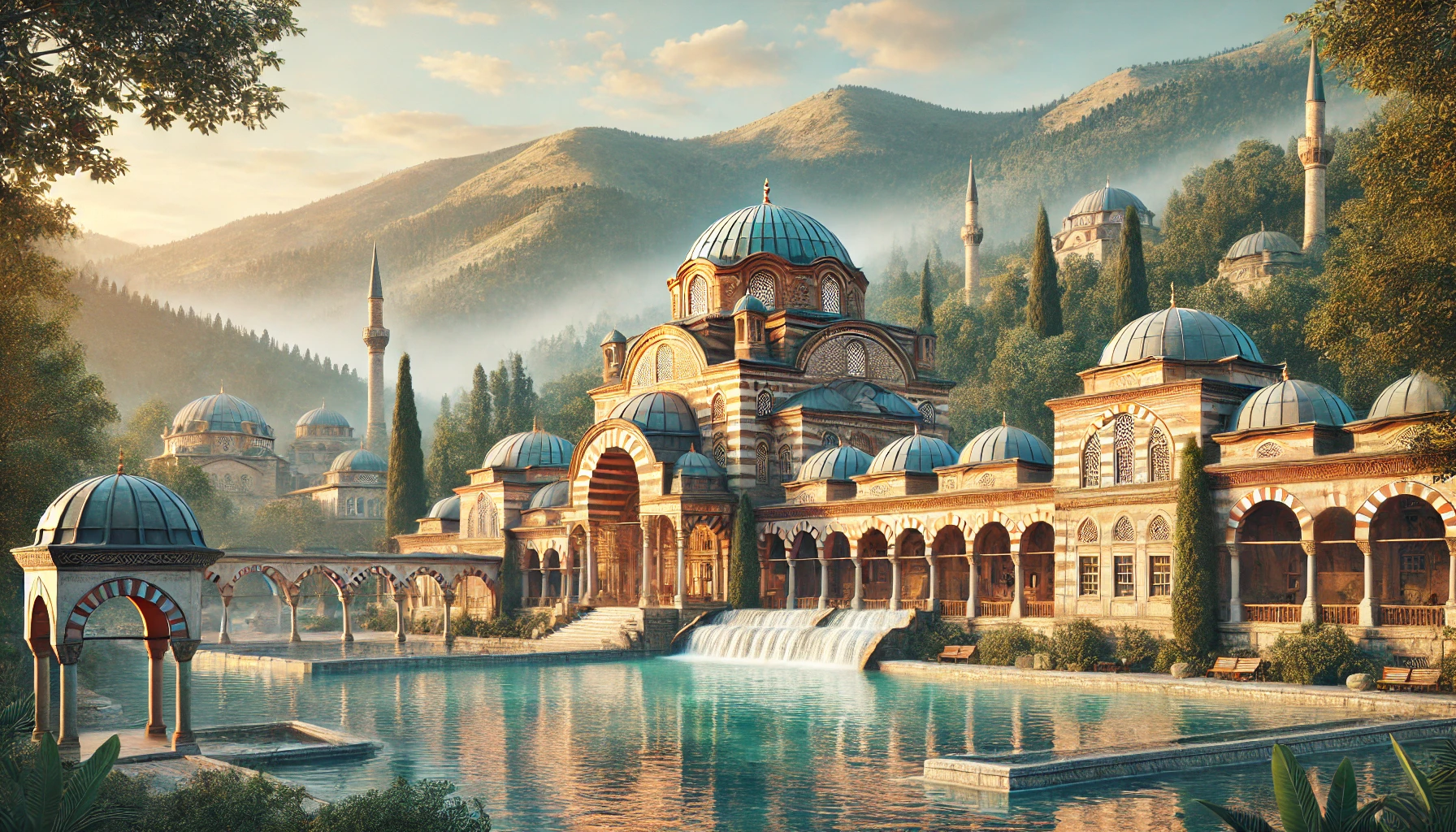Bursa: The Legacy of Healing Waters and Ottoman Splendor
Türkiye, a country known for its rich cultural heritage and stunning landscapes, is also a significant destination for thermal tourism. The tradition of thermalism, which refers to the therapeutic use of hot springs, has been practiced in Europe for centuries and is an integral part of the European cultural heritage. Türkiye, with its numerous thermal towns, plays a crucial role in this tradition. From ancient empires to modern-day wellness retreats, the thermal baths in Türkiye have offered healing and relaxation for thousands of years. This article explores the European Route of Historic Thermal Towns in Türkiye, highlighting the unique blend of history, culture, and natural beauty that each destination offers.
Afyonkarahisar: The Capital of Thermal Tourism in Türkiye
The Historical Significance of Afyonkarahisar
Afyonkarahisar, often referred to simply as Afyon, is considered the capital of thermal tourism in Türkiye. With a history spanning over 5,000 years, this city has been a crossroads of civilizations, including the Hittites, Phrygians, Romans, Byzantines, Seljuks, and Ottomans. The thermal tradition in Afyon began in ancient times and has been preserved and enhanced by the many societies that have called this historic city home.
The Healing Waters of Afyon
Afyon is home to numerous thermal springs, each known for its unique therapeutic properties. The waters in Afyon are rich in minerals such as calcium, magnesium, and bicarbonate, making them ideal for treating a variety of ailments, including rheumatism, skin conditions, and digestive disorders. Visitors to Afyon can enjoy a range of thermal experiences, from traditional Turkish baths to modern wellness resorts, all designed to promote relaxation and well-being.
Thermal Resorts and Cultural Heritage
Afyon is not only famous for its thermal springs but also for its rich cultural heritage. The city boasts impressive landmarks such as the Afyon Castle, the Ulu Mosque, and the ancient Phrygian Valley. Combining thermal treatments with cultural exploration makes Afyon a unique destination where history and wellness go hand in hand.
Bursa: The Historic Spa Town
Bursa’s Thermal Legacy
Bursa, another key city on the European Route of Historic Thermal Towns, has a deep-rooted thermal tradition that dates back to the Roman era. The city is renowned for its historic hot springs, particularly in the Çekirge district, where the healing waters have attracted visitors for centuries. The thermal baths of Bursa have been used for relaxation and medicinal purposes since ancient times, and they continue to be a popular attraction today.
Exploring Bursa’s Thermal Springs
The hot springs in Bursa are known for their high sulfur content, which is believed to have therapeutic effects on the skin, respiratory system, and musculoskeletal disorders. The Eski Kaplıca (Old Hot Spring) and Yeni Kaplıca (New Hot Spring) are among the most famous thermal baths in Bursa, offering traditional Turkish bath experiences in a historic setting. These baths are a testament to Bursa’s enduring reputation as a center of healing and wellness.
Bursa’s Cultural and Natural Attractions
In addition to its thermal springs, Bursa is famous for its cultural and natural attractions. The city is home to several UNESCO World Heritage Sites, including the Green Mosque, the Green Tomb, and the Grand Mosque. Mount Uludağ, a popular winter sports destination, adds to the city’s appeal, making Bursa a perfect blend of culture, nature, and wellness.
Pamukkale: The Cotton Castle of Türkiye
The Unique Travertines of Pamukkale
Pamukkale, meaning “Cotton Castle” in Turkish, is one of Türkiye’s most iconic natural wonders. The white travertine terraces, formed by mineral-rich thermal waters, create a surreal landscape that has been a UNESCO World Heritage Site since 1988. Pamukkale’s thermal waters have been renowned for their healing properties since ancient times, attracting visitors from around the world.
The Ancient City of Hierapolis
Adjacent to the travertines lies the ancient city of Hierapolis, a Greco-Roman spa town founded in the 2nd century BC. Hierapolis was known for its thermal baths, which were considered a sanctuary for healing and rejuvenation. The city’s ruins, including the well-preserved theater, the Temple of Apollo, and the Necropolis, offer a fascinating glimpse into the ancient practices of thermalism.
Pamukkale’s Modern Thermal Experience
Today, visitors to Pamukkale can enjoy both the natural beauty of the travertines and the therapeutic benefits of the thermal waters. The ancient thermal pools, known as the Cleopatra Pools, allow visitors to bathe in warm, mineral-rich waters surrounded by ancient columns and ruins. Pamukkale is a unique destination where nature, history, and wellness converge.
Yalova: The Gateway to Wellness
Yalova’s Thermal Springs
Yalova, located near the Sea of Marmara, is another significant thermal destination in Türkiye. The city’s thermal springs have been famous since Roman times, and they continue to draw visitors seeking health and relaxation. The waters in Yalova are rich in sulfur and are believed to be beneficial for various skin and joint conditions.
The Yalova Thermal Complex
The Yalova Thermal Complex is a major attraction in the city, offering a range of thermal baths, spa services, and wellness treatments. The complex, surrounded by lush forests and scenic landscapes, provides a serene environment for relaxation and rejuvenation. The combination of therapeutic waters and natural beauty makes Yalova a popular destination for those seeking a holistic wellness experience.
Exploring Yalova’s Natural Beauty
In addition to its thermal springs, Yalova is known for its beautiful natural surroundings. The city is home to several parks and nature reserves, including the Sudüşen Waterfall and the Termal Forest. Visitors can enjoy hiking, picnicking, and exploring the natural beauty of the region, making Yalova an ideal destination for both wellness and nature lovers.
Çeşme: A Coastal Thermal Haven
The Thermal Springs of Çeşme
Çeşme, located on the Aegean coast, is renowned for its beautiful beaches and crystal-clear waters. However, the town is also famous for its thermal springs, which have been used for therapeutic purposes since ancient times. The thermal waters in Çeşme are rich in minerals and are believed to be effective in treating various health conditions, including arthritis, skin disorders, and respiratory issues.
Combining Wellness and Leisure in Çeşme
Çeşme offers a unique blend of wellness and leisure, with thermal baths located near the town’s famous beaches. Visitors can enjoy a relaxing day at the beach, followed by a rejuvenating thermal bath, creating a perfect balance of relaxation and health. The town’s vibrant nightlife, excellent cuisine, and historic sites add to its appeal, making Çeşme a popular destination for both relaxation and entertainment.
Çeşme’s Cultural and Historical Attractions
In addition to its thermal springs, Çeşme is home to several cultural and historical attractions. The Çeşme Castle, built by the Ottomans in the 16th century, offers stunning views of the town and the Aegean Sea. The town’s historic center, with its charming streets and traditional houses, provides a glimpse into the region’s rich cultural heritage.
İzmir: The Thermal Heritage of the Aegean
İzmir’s Thermal Springs
İzmir, one of Türkiye’s most vibrant and cosmopolitan cities, is also home to several historic thermal springs. The Balçova Thermal Springs, located just outside the city center, are among the most famous, offering therapeutic waters that have been used for centuries. The thermal waters in İzmir are known for their high mineral content, which is believed to be beneficial for various health conditions, including rheumatism and skin disorders.
The History of Thermalism in İzmir
Thermalism has a long history in İzmir, dating back to ancient times when the city was known as Smyrna. The Romans, who recognized the healing properties of the thermal waters, established several baths in the region. Today, these ancient traditions continue, with modern wellness resorts offering a range of thermal treatments and therapies.
Exploring İzmir’s Cultural Attractions
In addition to its thermal springs, İzmir is a city rich in culture and history. The city’s historic sites, such as the ancient Agora of Smyrna and the Clock Tower, are popular attractions. İzmir’s vibrant markets, excellent cuisine, and beautiful coastline make it a perfect destination for those seeking a combination of wellness and cultural exploration.
Conclusion: The Timeless Appeal of Türkiye’s Thermal Towns
The European Route of Historic Thermal Towns in Türkiye offers a unique journey through the country’s rich cultural and natural heritage. From the ancient thermal springs of Afyonkarahisar to the stunning travertines of Pamukkale, each destination provides a blend of history, wellness, and natural beauty. Whether you’re seeking relaxation, healing, or cultural exploration, Türkiye’s thermal towns offer something for everyone. As you travel through these historic spa towns, you’ll discover the timeless appeal of thermalism in Türkiye and the enduring legacy of its healing waters.
For more information on planning your visit to Türkiye’s thermal towns, visit the Travel Guide of Türkiye.
Latest Update: Aug 11, 2024
Your Content Goes Here
A brief summary of the key points in this article.




